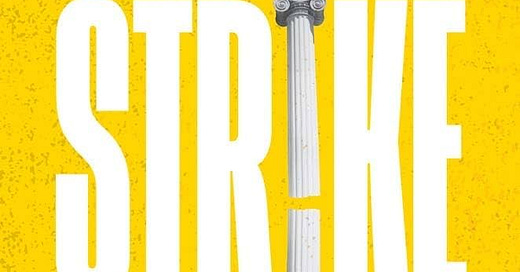As the line from the Communist Manifesto goes:
The history of all hitherto existing society is the history of class struggles.
Some find these words hyperbolic and detached from reality, others feel it speaks to something deeply embedded in their experience. I guess it depends on who you ask, but nonetheless you can certain find examples that make this words ring true.
A recent interview by Associate Professor of History Sarah Bond discussed her new book Strike: Labor, Unions, and Resistance in the Roman Empire. In her interviwed with Hyperallergic, she speaks to the ideological affinity between the free market capitalism of oligarchs such as Musk, Bezos, Zuckerberg and the stoicism of Roman Marcus Arelius.
Capitalists and amateur finance/tech bros, find Stoicism, with its emphasize on virtue and fate, a compelling narrative. It mixes well with capitalist ideology which sees the source of capitalist relations as the inate qualities of people and things regardless of historical circumstance.
Judicial Papyrus of Turin, verso ii, containing the records of the strike
Now I haven’t read the book, but I was interested in her mention of the first ever recorded strike in human history, the Turin Strike Papyrus. An uprising took place in 1157 BCE between workers and emperor Ramesses III. The tomb workers at Deir el Medina did not receive their wage rations of emmer and wheat, and in response the workers decided to without their labor.
The scribe Amennakhte recounts how general laborers and skilled artisans took park in strikes and sit-ins. They sat at the back of the temple, waiting until they would eventually be paid for their past labor. In their resistance, these ancient workers shouted “We are hungry, for 18 days have already elapsed in this month”.
As Bond points out, these workers understood that they cannot be removed collectively by the Pharoah’s soldiers. Their numbers were too great. This type of class struggle and protest is rarely written about by the high-class roman scholars, and theirs good reason why. It was against their class interest!
The manner in which we view an assembly of the masses as a “mob”, as the utmost form of tyranny, is a perfect example of how centuries of class rule have colored our understanding of just resistance. As Bond argues, anti-assembly behaviour that demonizes people have always made the exploiters look like heros and the exploited like villians.







"The tomb workers at Deir el Medina"; but did they win in the end?
In transhistorical solidarity! 😃
Whoa this is cool!